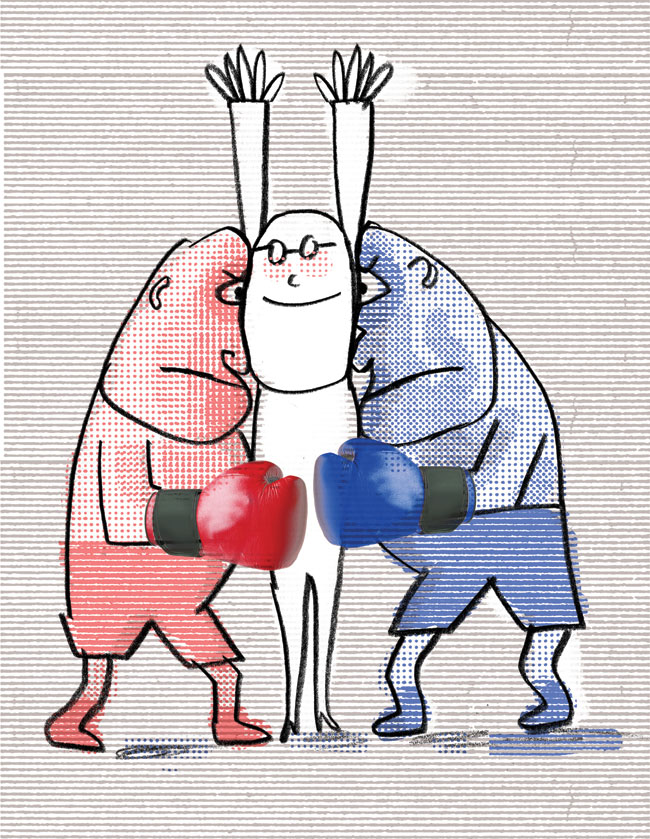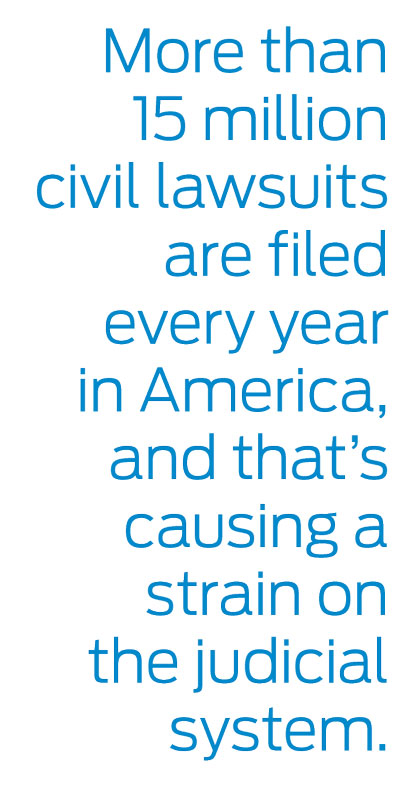
As Americans, we believe in justice. In the Pledge of Allegiance, we ratify that there should be “justice for all.” Our courts act as a guardian and interpreter of the Constitution and of our laws. Our judges and juries help keep our streets safe, our property secure, and our freedom intact.
Courts are also used to settle private disputes. And, because the right to a day in court is so important, America opens this opportunity to everyone. The courts charge modest filing fees but do not otherwise charge litigants to use its judges, personnel, and buildings. A filing fee of $250 does not come close to fully paying for the court to hear a case. The annual cost to the U.S. economy from civil litigation is estimated at $233 billion.
The ease of access to the courthouse enables our judicial system to provide a service that our public uses — often. More than 15 million civil lawsuits are filed every year in America, and that’s causing a strain on the judicial system.
And, despite the fact that the government subsidizes the costs of the courtroom itself, bringing a suit is a terrifically expensive endeavor. Lawyers typically spend hundreds or even thousands of hours by the time a case reaches the decision stage. An average civil case, start to finish, can cost each side to the controversy in excess of $100,000. For business disputes, the amount is frequently in the millions. Little wonder that it is said that litigation is a rich person’s game.

In one of the more colorful examples of what a win looks like, consider Buchwald v. Paramount, in which writer Art Buchwald and his partner Alan Bernheim sued Paramount Pictures over the 1988 Eddie Murphy movie, Coming to America. Buchwald and Bernheim claimed the story was their idea (a few years prior to the film’s release, they’d sent Paramount a treatment for a similar concept) and filed suit, asking for $6.2 million. After lengthy litigation, they were awarded $900,000. That sounds like a lot of money, but when all was said and done, they’d spent more than $2 million in legal fees.
Fortunately, there is an alternative to litigation, an option too few of us think about when we feel we’ve been wronged: mediation. Throughout the United States, pioneering lawyers, clients, and others are discovering that they can utilize the objective standards set and safeguarded by the courts without always having to suffer the risk, expense, time, and aggravation of litigating. Mediation is an effective and creative way to satisfy our interests. Sometimes, it can work even better than litigation.
Fortunately, there is an alternative to litigation, an option too few of us think about when we feel we’ve been wronged: mediation. Throughout the United States, pioneering lawyers, clients, and others are discovering that they can utilize the objective standards set and safeguarded by the courts without always having to suffer the risk, expense, time, and aggravation of litigating. Mediation is an effective and creative way to satisfy our interests. Sometimes, it can work even better than litigation.
Even though the results of litigation are uncertain, the right to start a lawsuit or defend yourself in court is vital to the very notion of due process under the law. But the sheer volume of lawsuits is threatening to undermine that right. In today’s climate of austerity, courts have not been able to hire needed judges to manage the extra workload. Simultaneously courts have been required to reduce hours of operation and lay off vital staff — even as record numbers of lawsuits continue to be filed. In January of this year, the 9,000-member New York County Lawyers’ Association (NYCLA) issued a report, “Courts in Crisis,” which warned that courts in the New York region were “dangerously close to the point where they cannot meet their constitutional and statutory duties.” Similar conditions exist nationwide. In some jurisdictions, you must wait months or even years to have your case heard.
As mentioned above, litigation is costly, but not just as measured in dollars. The lawyer does not do all the work. Clients must support the lawyer in presenting the facts, documents, and other considerations to the lawyer and to the judge and jury. Clients make frequent trips to lawyers’ offices and spend much time thinking — even obsessing — about their matters, frequently at the expense of other business, personal, and family matters.
A further aggravation is the frequent delays. It is said that “justice delayed is justice denied.” But as the NYCLA report found, delays are now routine due to hiring freezes, reduced court hours, and hang-ups at every stage of court proceedings, including “delays in obtaining files … , delays in trials, delays in motion practice, delays in obtaining decisions, and delays in the processing of papers.”
Additionally when all is said and done litigation is risky. Only 50 percent of parties can be successful. Put another way, if 15 million cases a year in the United States go to trial, each year there will be at least 15 million losers.
Despite the financial and opportunity costs, the delays, the aggravation, and the risks, clients frequently tell their lawyers, “At least I’ll have my day in court.” Ah, if only that were the case. More than 90 percent of cases settle before they go to trial — more often than not they settle “on the courthouse steps,” that is, shortly before trial. In those cases, clients will have already paid for much of the preparation, and have already endured the aggravations and delays associated with preparing for a trial.
So, why sue? When you tally up the costs, it frequently doesn’t make sense. Buchwald realized his mistake, but only after the ordeal was over. “When I got involved, I expected to be in a business dispute that I assumed would be resolved early in the game for a minimal sum of money and hopefully an apology,” he wrote. “One of the discoveries of a suit such as this is that it makes you hurt deeply, and you don’t forgive easily. [Another thing I discovered:] Do not count on any money in a lawsuit — this is as true if you win as if you lose.”
Become a Saturday Evening Post member and enjoy unlimited access. Subscribe now



